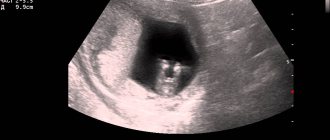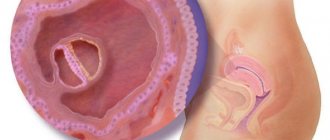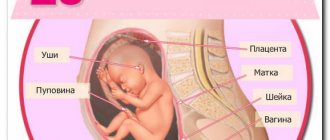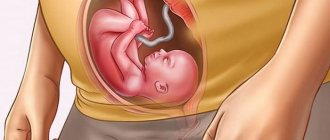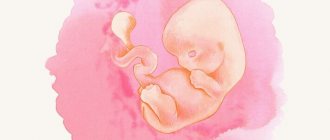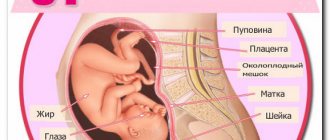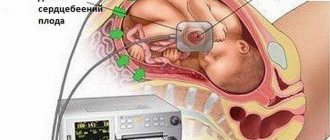Based on the All-Russian pregnancy management program, a woman undergoes a complete examination (screening) three times during the perinatal period. In the absence of atypical manifestations, the following terms are established in each of the three trimesters:
- primary – from the tenth to the fourteenth weeks;
- again - from 20 to 24;
- last screening – from 32 to 34.
A routine ultrasound is not performed at 17 weeks of pregnancy. If desired, the expectant mother can undergo the study on her own. Ultrasound is absolutely safe for the baby, so the frequency of ultrasound diagnostics has no restrictions. The gynecologist prescribes an additional (unscheduled) procedure based on symptoms that may indicate a normative deviation in fetal development.
Why and to whom is the study assigned?
When it comes to routine examination and research, an ultrasound scan is often prescribed at 20-22 weeks. But if the expectant mother suspects any developmental abnormalities, she should attend an ultrasound examination already at 17 weeks.
At this time, it is possible to most accurately determine the sex of the child. The embryo is more active and mobile this week. If you still cannot find out whether a boy or a girl will be born in the future, you should try again at 23 or 25 weeks.
An ultrasound examination should be prescribed by a doctor if a woman’s tests, biochemistry results, etc. are unsatisfactory.
If a pregnant woman is feeling unwell, you should also be wary. The reasons for this may be abnormal processes occurring in the womb. So that the attending physician can exclude the presence of all possible pathologies, abnormalities and congenital diseases, you should visit an ultrasound scan.
Attention! If symptoms of any pathologies are detected in the fetus, a woman should not hesitate! It is advisable to do an ultrasound as soon as possible to make sure the baby is healthy or to begin immediate treatment.
Questions by email and answers to them
18 weeks pregnant - how many months? Eighteen obstetric weeks of pregnancy are 16 weeks from conception or the 4th month of pregnancy.
Cold at 18 weeks of pregnancy. How to treat? During pregnancy with influenza and acute respiratory viral infections, take oscillococcinum, it is not dangerous for the fetus. The powder can be diluted in water or poured under the tongue and held until it is completely dissolved. Remember that a temperature of up to 37.4 ºС is normal body temperature during pregnancy, and there is no need to bring it down.
We are 18 weeks pregnant. The doctor said that we will have twins. And the floor is still not visible, they spin forever. Are twins two boys or two girls? Or can there be both a boy and a girl? Twins and triplets are simply the number of children in a multiple pregnancy. In medicine, such children are called twins in any case. But there are fraternal twins, that is, when two different sperm fertilize two different eggs, thus each fetus has its own placenta. Such children can be either different-sex or same-sex. They usually look similar to each other, as if they were born separately at different times, such as a year apart. And there are identical twins - this is when one egg was fertilized by one sperm (as in a singleton pregnancy), but then it divided into parts. These are same-sex children, similar to each other like two peas in a pod. They most often have one placenta between them. Usually the eye color, hair color, height and build are also the same. Thus, you need to find out from your doctor whether you will have identical or fraternal twins.
I'm 18 weeks pregnant and the pregnancy is progressing normally. But sex from the first month of pregnancy does not bring pleasure: everything there is dry and as if swollen, painful and tight when it enters, in general, there is zero pleasure. In addition, there is no sexual desire at all, although they say that during pregnancy it is the opposite - increased excitability. If sex during pregnancy causes discomfort, you can use a lubricant as an additional lubricant (if dry) or spend more time on foreplay, and also choose positions that are comfortable for penetration, for example, “reclining” (the woman lies on her back on the edge of the bed, with her legs bent in knees or throwing them over the man’s shoulders, while he kneels in front of the woman, moving to the edge of the bed). You can also get by with oral sex, which does not bring any discomfort during pregnancy.
Condition of mother and fetus
Since the fetus is actively developing and increases along with the volume of amniotic fluid, the expectant mother’s belly increases in size. It becomes spherical and protrudes significantly forward, and those around them immediately notice the woman’s pregnancy.
Due to the large amount of amniotic fluid, the expectant mother may experience nagging pain in the lower abdomen. Breast size increases, nipples become darker. Everything that happens to a woman speaks of the restructuring of her body for the birth of a child.
At the 17th week of pregnancy, the first signs of immunity appear in the unborn child. The muscles of the back and neck are formed, thanks to which the fetus can make various movements with its body.
Women's feelings during pregnancy
A woman in the eighteenth week of pregnancy begins to feel much better. There is usually no toxicosis, but another symptom may appear. You may notice that due to the stretching and pressure of the uterus, the internal organs are moving downward. For this reason, pregnant women more often experience the urge to urinate, constipation and other unpleasant sensations occur.
The following changes are also noted:
- Moving the center of gravity. It is accompanied by pain in the back and lower back, you may lose your balance, although your stomach is still small. Move carefully, you need time to get used to the new state. Unpleasant sensations can be removed with a relaxing back massage. Rest often and avoid excessive stress on the body;
- The fetus requires more oxygen and you may feel short of air. At this time, you need to spend more time in the fresh air. The same goes for nutrition. The baby is actively growing and absorbing nutrients entering your body through food. It is during this period that the mother’s rapid weight gain begins. Constantly weighing yourself will help you control your weight;
- It is necessary to do not only an ultrasound, but also a regular urine test. During this period, the body is susceptible to infections that are dangerous to the woman and fetus. Discomfortable sensations in the area of the bladder and genitals may be a signal of the onset of infection;
- Pregnant women often experience decreased visual acuity. Don't be alarmed if you notice that you can't see what you previously saw without difficulty. This is specifically related to pregnancy. But if you have previously had problems and were seen by a doctor, you will have to pay close attention to the problem. In some situations, independent childbirth is impossible, even if ultrasound shows no contraindications, but the visual system suffers;
- At the eighteenth week, you may notice an increase in discharge. This is the norm for this period and is not a deviation. Mucus is produced to protect the fetus and occurs due to an increase in progesterone in the body. The main thing is that the discharge is not bloody and does not have an unpleasant odor.
As a rule, women are in a good mood in this trimester; nothing irritates them anymore, unless there are serious reasons. The belly begins to round, others begin to notice it, although sometimes it is possible to hide its interesting position. An ultrasound will give a complete assessment of the condition of the fetus, and the doctor will tell you how to adjust your lifestyle so that the baby develops calmly and correctly.
What do they look for during the examination?
A specialist performing ultrasound diagnostics will help you find out a lot of facts and information about your unborn baby.
Some of the indicators are:
- the size of the embryo and its compliance with the established standards;
- the presence or absence of malignant or benign neoplasms;
- identification of some genetic diseases transmitted by inheritance.
In addition to examining the fetus, the doctor examines the mother’s organs. The specialist observes the condition of the uterus and kidneys. It is also possible to examine other organs, depending on what is of interest to the attending physician.
Is it possible to find out the gender of the child?
As mentioned earlier, it is quite possible to find out the sex of the unborn baby at 17 weeks of pregnancy. The doctor must recognize the outlines of the fetal genital organs on the ultrasound screen. The specialist is faced with a difficult task - to determine the penis and scrotum in a male fetus, and the outline of the labia in a girl.
An important factor is what position the child is currently in. If the embryo covers its genitals with its legs, or is in another inappropriate position, it is not possible to determine its sex. In any case, you need to keep in mind that the diagnostic center employee may make a mistake and name the wrong gender.
Reference! If the labia of a female fetus are swollen, they may be mistaken for a male scrotum. A similar thing can happen with the penis, which may be confused with the finger of the pen or part of the umbilical cord.
Uterus
Don’t be alarmed by the occasional mild pain in the uterine area – it is constantly growing, and now more upwards than to the sides. Many new inconveniences will be associated with this: heartburn, frequent urination, shortness of breath. The uterus takes up more and more space, so the internal organs are forced to make room and move a little to the sides.
The uterus at 17 weeks of pregnancy can be felt at a distance of 3.8-5 cm below the navel. The height of the uterine fundus usually corresponds to the gestational age in centimeters, that is, now it should rise on average at a level of 17 cm above the pubis.
Due to the growth of the uterus, start looking for new comfortable sleeping positions: sleeping on your back and stomach is no longer recommended (in the first case, the weight of the uterus presses on the vena cava, blocking the access of blood to the fetus; in the second, the uterus itself experiences strong pressure).
Stomach
The growth of the uterus and fetus cannot but affect your appearance - the belly at the 17th week of pregnancy noticeably rounds and grows. Don’t worry if everything is different for you: if the fetus is located at the back wall of the uterus or is too low, the tummy may only now begin to protrude.
All the most important events take place in it, so you can experience many different sensations associated with the abdomen: the first movements of the fetus, slight pain or the first heaviness associated with an increase in size. But know that normally your stomach should not hurt - you should pay attention to this.
Photo of the fetus
The photo of the fetus shows that the baby has already grown well and looks like a little man. Hands and legs are visible. You can also see the baby’s facial features: nose, mouth and even ears. In the body you can see the bones and spine of the fetus.
boy
Girls
Normal indicators
The longer the baby develops, the more factors appear for observation and comparison. Using an ultrasound image, the doctor carefully studies information about the unborn child, especially the size of the fetus. Afterwards, the doctor can tell with sufficient accuracy about the condition of the embryo.
The standards that guide the specialist are:
- size of the forehead and back of the head area – 41-49 mm;
- tibia bone – 15-21 mm;
- thigh bone – 20-28 mm;
- shoulder bones – 15-21 mm;
- forearm bones – 15-18 mm;
- head circumference – 112-136 mm;
- abdominal circumference – 121-149 mm.
Fruit size
The coccygeal-parietal size of the fetus (CTP) at week 17 will be on average 13 cm, and the weight will be about 140 grams.
Is ultrasound dangerous?
The ultrasound examination procedure has no special contraindications. This examination method is completely harmless for both the expectant mother and the child. In terms of safety, three-dimensional and two-dimensional ultrasound methods do not differ.
In any case, before performing an ultrasound examination, you should consult with a specialist to exclude the presence of individual intolerances.
Where do they make it and how much does it cost?
An ultrasound examination at the 17th week of pregnancy can be performed in any average clinic in a large city. In order for an ultrasound to take place safely, only a few components are required: a qualified specialist and special equipment.
The cost of performing an ultrasound examination during pregnancy varies significantly depending on the location, specialist, and equipment. It is generally accepted that the price for an ultrasound scan of a given area in a big city is from 800 to 1600 rubles.
Nutrition
Nutrition for a pregnant woman at 18 weeks
The diet of a woman in the 18th week of pregnancy should provide the expectant mother and her baby with all the necessary nutrients. An increased appetite is not a reason to forget about simple rules:
- portioned meals. You need to eat 5-6 times a day, in small portions;
- Do not mix different dishes into one meal;
- you need to follow the drinking regime. Drink 2 - 2.5 liters of liquid per day. It is better to give preference to drinking water;
- It is advisable to make the diet from vegetables and fruits, not forgetting to include meat and dried fruits;
- It is recommended to cook by steaming or in the oven. Fried foods are best avoided. Avoid smoked, dried and salted foods.
At the 18th week of pregnancy, the fetus consumes many vitamins and minerals from the mother's body. To provide him with everything he needs and maintain his own health, it is advisable for the expectant mother to consume products containing:
- Calcium: cottage cheese, cheese, almonds, white beans, bananas, broccoli, sesame;
- Magnesium: buckwheat, oatmeal, brown rice, chicken eggs, spinach, walnuts;
- Vitamin D: beef liver, chicken eggs, sea fish, red caviar;
- Iodine: prunes, cod, turkey, potatoes, seaweed, strawberries, cranberries;
- Zinc: carrots, beets, cabbage, bran, beef liver, chicken;
- Iron: beans, apples, offal;
- Selenium: buckwheat, oatmeal, meat, offal, seaweed;
- Fluoride: chicken eggs, buckwheat, rice, apples, chicken and beef;
- Phosphorus: fish, chicken eggs, dairy products;
- vitamin A: carrots, pumpkin, liver, dried apricots;
- B vitamins: red meat, walnuts, bananas, oats, asparagus, almonds;
- Vitamin C: rosehip, red bell pepper, sea buckthorn, black currant, parsley, kiwi, citrus fruits;
- Vitamin E: fish, spinach, chicken eggs, almonds, broccoli, sunflower seeds;
- Vitamin K: asparagus, cucumbers, green onions, prunes, broccoli.
Vitamins
In addition to a proper diet, your gynecologist may recommend taking vitamins or supplements. Multivitamin complexes should be taken strictly in the prescribed dosage. A pregnant woman should remember that an excess of vitamins can be as harmful as their deficiency.
Weight
During the 18 weeks of pregnancy, most women gain between 3 and 5 kg in weight. For the next 7 days, it is advisable to gain no more than 400 g.
If, without changing the diet, while observing the rules of eating behavior, a woman has gained more than a kilogram in a week, this is a reason to consult a doctor. Very often, excess weight hides edema, which he must be aware of.
